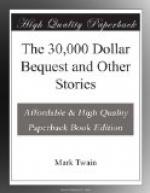This beautiful creation loses nothing by repetition. On the contrary, the oftener one sees it in the Ledger, the more grand and awe-inspiring it seems.
With one more extract I will close:
Doble.—On the 4th inst., Samuel Pervil Worthington Doble, aged 4 days.
Our little Sammy’s
gone,
His tiny spirit’s
fled;
Our little boy we loved
so dear
Lies sleeping with the
dead.
A tear within a father’s
eye,
A mother’s aching
heart,
Can only tell the agony
How hard it is to part.
Could anything be more plaintive than that, without requiring further concessions of grammar? Could anything be likely to do more toward reconciling deceased to circumstances, and making him willing to go? Perhaps not. The power of song can hardly be estimated. There is an element about some poetry which is able to make even physical suffering and death cheerful things to contemplate and consummations to be desired. This element is present in the mortuary poetry of Philadelphia degree of development.
The custom I have been treating of is one that should be adopted in all the cities of the land.
It is said that once a man of small consequence died, and the Rev. T. K. Beecher was asked to preach the funeral sermon —a man who abhors the lauding of people, either dead or alive, except in dignified and simple language, and then only for merits which they actually possessed or possess, not merits which they merely ought to have possessed. The friends of the deceased got up a stately funeral. They must have had misgivings that the corpse might not be praised strongly enough, for they prepared some manuscript headings and notes in which nothing was left unsaid on that subject that a fervid imagination and an unabridged dictionary could compile, and these they handed to the minister as he entered the pulpit. They were merely intended as suggestions, and so the friends were filled with consternation when the minister stood in the pulpit and proceeded to read off the curious odds and ends in ghastly detail and in a loud voice! And their consternation solidified to petrification when he paused at the end, contemplated the multitude reflectively, and then said, impressively:
“The man would be a fool who tried to add anything to that. Let us pray!”
And with the same strict adhesion to truth it can be said that the man would be a fool who tried to add anything to the following transcendent obituary poem. There is something so innocent, so guileless, so complacent, so unearthly serene and self-satisfied about this peerless “hog-wash,” that the man must be made of stone who can read it without a dulcet ecstasy creeping along his backbone and quivering in his marrow. There is no need to say that this poem is genuine and in earnest, for its proofs are written all over its face. An ingenious scribbler




